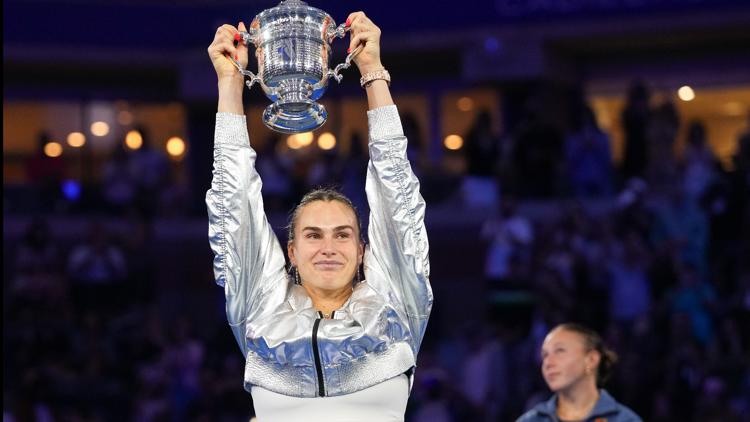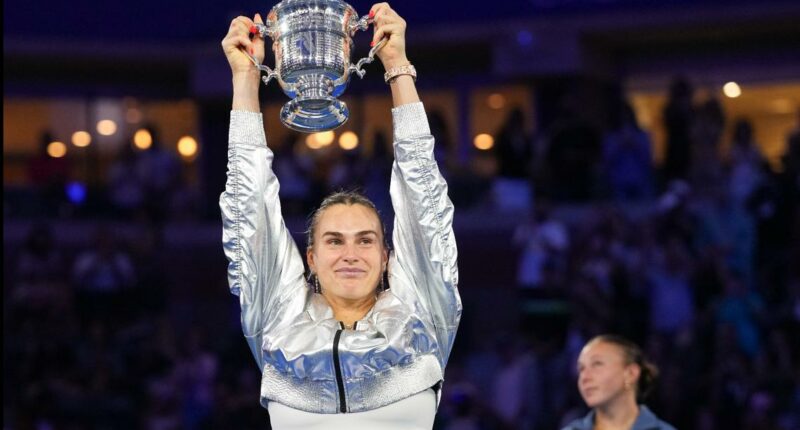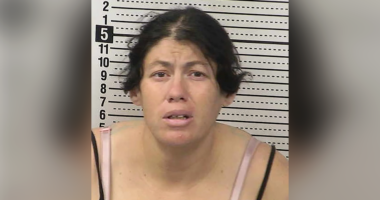Share this @internewscast.com

She triumphed in the U.S. Open final with a score of 6-3, 7-6 (3), becoming the first woman to secure the tournament title in back-to-back years since Serena Williams achieved the feat over a decade ago.
NEW YORK — Aryna Sabalenka demonstrated precision and power, dominating Amanda Anisimova to claim a 6-3, 7-6 (3) victory in the U.S. Open final on Saturday, marking her as the first woman to win consecutive titles since Serena Williams more than ten years ago.
The No. 1-ranked Sabalenka picked up the fourth Grand Slam title of her career, all on hard courts. This was not all smooth sailing, though.
In the second set, Sabalenka twice held a break advantage and served for the championship at 5-4. At 30-all, poised to reach match point, she faced an opportunity to smash an overhead but, while retreating, she hit the ball into the net, offering Anisimova a break chance.
Following the painful error, Sabalenka let her racket fall to the blue court and gave a wry smile. Soon after, Anisimova — a 24-year-old American — capitalized on the break to even the score at 5-all, prompting cheers from the Arthur Ashe Stadium crowd of about 24,000 fans.
However, just 15 minutes after the slip-up, Sabalenka was on her knees, covering her face with her hands, having succeeded on her third match point — which was expected, given she rarely loses tiebreakers; this victory improved her to 21-1 in such situations this year, with 19 consecutive wins.
Not since Williams took three straight titles from 2012-14 had a woman repeated as the champ in New York.
The result also meant Sabalenka avoided becoming the first woman to lose three major finals in a single season since Justine Henin in 2006.
“All those tough lessons (were) worth this one,” Sabalenka said. “I’m speechless right now.”
The 27-year-old from Belarus was runner-up to Madison Keys at the Australian Open in January and to Coco Gauff at the French Open. Then, in July at Wimbledon, she was ousted by Anisimova.
That put Anisimova into her first major final, which she lost 6-0, 6-0 to Iga Swiatek. But Anisimova put that shutout behind her immediately, well enough to win a rematch against Swiatek in the U.S. Open quarterfinals.
“Losing in two finals in a row is great, but then it’s also super hard,” said Anisimova, who sat and buried her face in a towel after the match was over. “I think I didn’t fight hard enough for my dreams today.”
Sabalenka told her: “I know how much it hurts losing in the finals, but trust me … you’re going to win (one). … Girl, you’re going to enjoy it even more after these tough losses in the finals.”
When Anisimova trailed Sabalenka 2-0, 30-love as Saturday’s match began, some fans might have wondered: There’s no way there’s going to be a repeat of the final at the All England Club, right?
Anisimova grabbed the next four points to break back, capping the game with a backhand winner and a forehand winner. That got the partisan fans up on their feet, shouting, and Anisimova exhaled as she walked to the sideline and wiped sweat from her forehead.
Soon, she led 3-2. But Sabalenka took the next four games and that set.
It began pouring before the match, so Ashe’s artificial lights were on, and its retractable roof was shut. That appeared to be a distraction at times to Anisimova, who motioned to her team in the stands that something was bothering her during ball tosses for serves.
The setup also created windless conditions, ideal for two ball-strikers who really can bring the power with good contact. And that’s what they both did from the start, striking speedy serves and deep groundstrokes with so much pace that responding was never simple.
Some exchanges were breathtaking — to them, certainly, and to spectators who gasped at the power during longer points.
Both are aggressive during back-and-forths and rarely are risk-averse. The rewards can be huge, as can the mistakes, and Anisimova was seeking the lines with full cuts off both sides.
Of Sabalenka’s first 13 points, which helped her claim the initial two games, just one came via her own winner. The other dozen arrived thanks to Anisimova’s six unforced errors and six forced errors.
By the end, Anisimova had nearly twice as many winners as Sabalenka, 22-13, and nearly twice as many unforced errors, too, 29-15.
“You are so incredible,” Anisimova told Sabalenka during the trophy ceremony. “I’m in awe of what you’ve accomplished, and you keep on achieving so many incredible things.”
Copyright 2025 Associated Press. All rights reserved. This material may not be published, broadcast, rewritten, or redistributed.

















